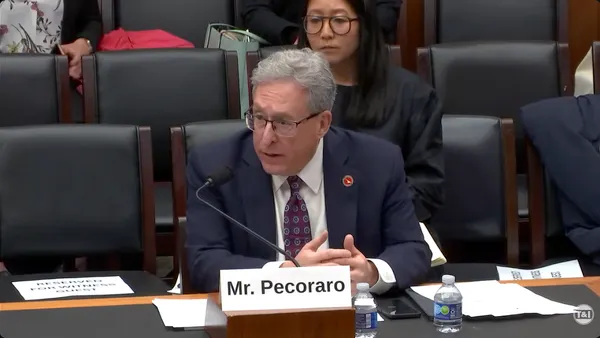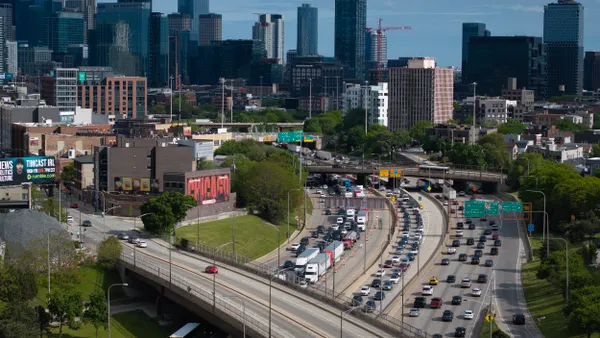Dive Brief:
- U.S. Sen. Edward Markey, D-MA, and Rep. Steve Cohen, D-TN, introduced the Complete Streets Act Wednesday in Congress, a federal law to promote safer street design. The bill would require states to set aside 5% of federal highway funding for a grant program that would fund Complete Streets projects.
- The legislation would allow eligible local and regional entities to apply for technical assistance and capital funding to build projects, such as sidewalks, bike lanes, crosswalks and bus stops. It has already received statements of support from ride-hailing companies Lyft, Uber and Via, as well as the National Complete Streets Coalition (NCSC), a Smart Growth America program that advocates for Complete Streets.
- To push for Congress’ approval, NCSC separately released an addendum to its "Dangerous by Design 2019" report, which ranks states and cities on the dangers faced by pedestrians. The addendum segments pedestrian fatalities by Congressional district in both absolute numbers and by rate per 100,000 people. Arizona’s 7th Congressional District, represented by Democratic Rep. Ruben Gallego, topped that ranking. Gallego is a co-sponsor of the bill in the House.
Dive Insight:
This bicameral legislation comes at a critical time for street safety, with pedestrian deaths and vehicle crashes ticking upwards. According to a report from the Governors Highway Safety Administration (GHSA) earlier this year, the number of pedestrian fatalities in 2018 is projected to be the highest since 1990: at 6,227, a 4% increase over 2017. GHSA has blamed that uptick on a series of factors, including increased smartphone use and alcohol impairment of drivers and pedestrians.
The Complete Streets movement has gathered steam over the years as city and state governments look to improve safety, but plenty of work remains. In May, NCSC recognized 10 communities that drafted and implemented the best Complete Streets policies of 2018, with Cleveland Heights, OH at the top. But the push has been largely at the local level, with cities and states left to their own devices by the federal government, so this bill might be an effective way to give those efforts more clout.
Ride-hailing companies’ support could also be crucial to help the bill gain traction in Congress. Each company has looked to offer services beyond single-occupancy vehicles, with Uber and Lyft investing heavily in scooters and dockless bikes while also partnering to provide information on public transit in certain cities like Cincinnati, OH and Denver. Uber has gone further than that by producing principles it would like to see in future infrastructure investment, a call that includes designing streets for different uses beyond just cars.











